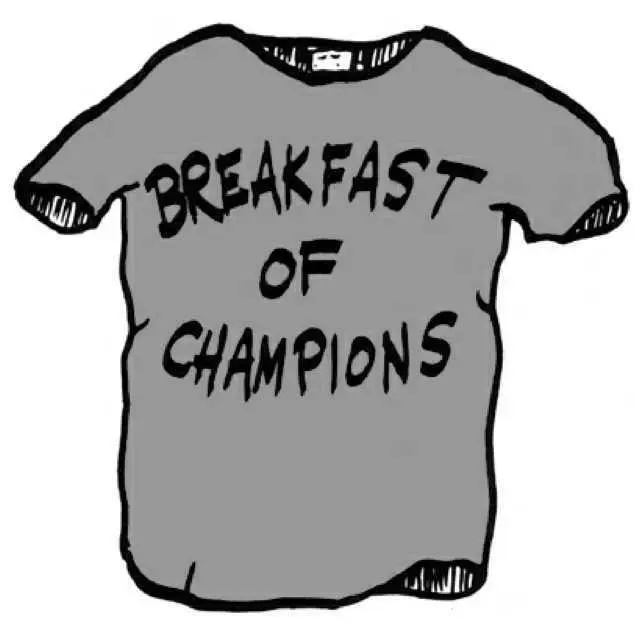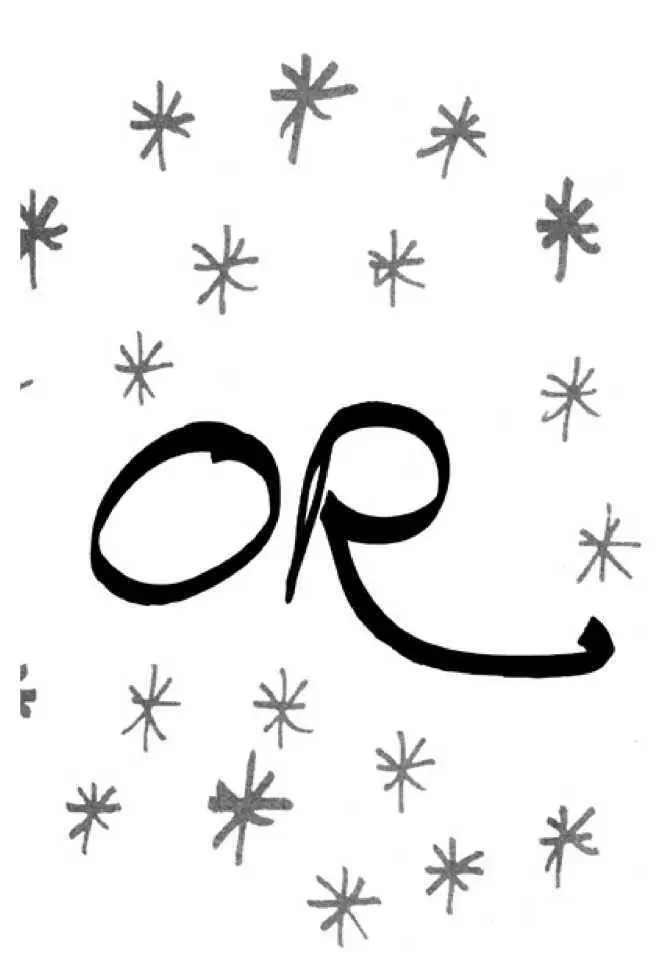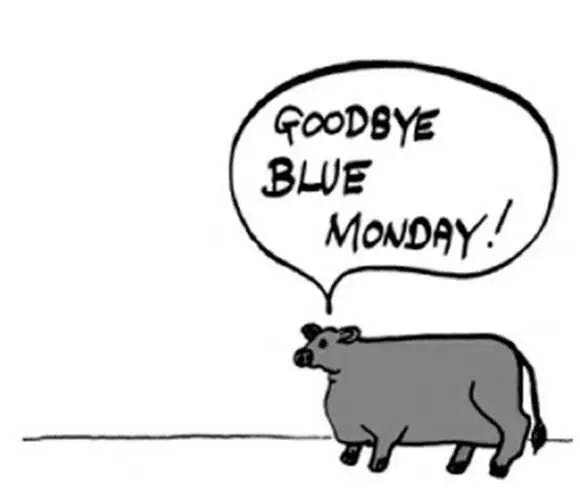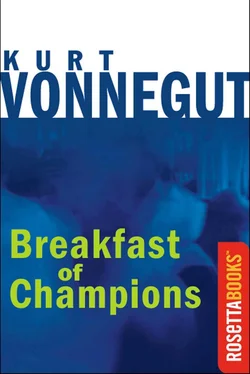In Memory of Phoebe Hurty, who comforted me in Indianapolis—during the Great Depression.
When he hath tried me, I shall come forth as gold.
-Job
“We are healthy only to the extent that our ideas are humane” — so reads the epitaph for Kilgore Trout, who is one of several alter egos of the author Kurt Vonnegut in his explosively funny and ironic 1973 novel Breakfast of Champions. The world Vonnegut explores is not a healthy one — as the title suggests, it is the United States of America in the age of Vietnam, Nixon and the Silent Majority — but it is desperately trying to seem so. An obscure science fiction writer takes a wild road trip to the middle of the Midwest, where his fate becomes intertwined with that of a successful car dealer who is slowly going mad. Vonnegut takes this opportunity to question a number of assumptions, including the very nature of the novel he is writing. A tour de force of imagination and scathing insight, Breakfast of Champions is one of the most discussed and widely read American novels of the late 20th century.
The American novelist Kurt Vonnegut (b. 1922) occupies an unusual but enduring place in modern American fiction, that of the prolific, critically acclaimed writer whose work has also enjoyed enormous popularity and inspired a virtual cult following. Vonnegut’s first work appeared in the early 1950s, and few writers have captured the modern age as consistently and as imaginatively as he has. Often blending satire with science fiction, Vonnegut’s writing reflects an acute sense of the ironies in modern American life. Nowhere is his richly ambivalent feeling about the contemporary American scene more brilliantly realized than in Breakfast of Champions , published just after Vonnegut’s 50th birthday, ending a four-year hiatus that followed appearance of Slaughterhouse Five.
RosettaBooks is the leading publisher dedicated exclusively to electronic editions of great works of fiction and non-fiction that reflect our world. RosettaBooks is a committed e-publisher, maximizing the resources of the World Wide Web in opening a fresh dimension in the reading experience. In this electronic environment for reading, each RosettaBook will enhance the experience through The RosettaBooks Connection. This gateway instantly delivers to the reader the opportunity to learn more about the title, the author, the content and the context of each work, using the full resources of the Web.
Other Vonnegut titles available from RosettaBooks include Slaughterhouse Five, Cat’s Cradle, The Sirens of Titan and Player Piano.



The expression “Breakfast of Champions” is a registered trademark of General Mills, Inc., for use on a breakfast cereal product. The use of the identical expression as the title for this book is not intended to indicate an association with or sponsorship by General Mills, nor is it intended to disparage their fine products.
The person to whom this book is dedicated, Phoebe Hurty, is no longer among the living, as they say. She was an Indianapolis widow when I met her late in the Great Depression. I was sixteen or so. She was about forty.
She was rich, but she had gone to work every weekday of her adult life, so she went on doing that. She wrote a sane and funny advice-to- the-lovelorn column for the Indianapolis Times, a good paper which is now defunct.
Defunct.
She wrote ads for the William H. Block Company, a department store which still flourishes in a building my father designed. She wrote this ad for an end-of-the-summer sale on straw hats: “For prices like this, you can run them through your horse and put them on your roses.”
Phoebe Hurty hired me to write copy for ads about teenage clothes. I had to wear the clothes I praised. That was part of the job. And I became friends with her two sons, who were my age. I was over at their house all the time.
She would talk bawdily to me and her sons, and to our girlfriends when we brought them around. She was funny. She was liberating.
She taught us to be impolite in conversation not only about sexual matters, but about American history and famous heroes, about the distribution of wealth, about school, about everything.
I now make my living by being impolite. I am clumsy at it. I keep trying to imitate the impoliteness which was so graceful in Phoebe Hurty. I think now that grace was easier for her than it is for me because of the mood of the Great Depression. She believed what so many Americans believed then: that the nation would be happy and just and rational when prosperity came.
I never hear that word anymore: Prosperity. It used to be a synonym for Paradise. And Phoebe Hurty was able to believe that the impoliteness she recommended would give shape to an American paradise.
Now her sort of impoliteness is fashionable. But nobody believes anymore in a new American paradise. I sure miss Phoebe Hurty.
As for the suspicion I express in this book, that human beings are robots, are machines: It should be noted that people, mostly men, suffering from the last stages of syphilis, from locomotor ataxia, were common spectacles in downtown Indianapolis and in circus crowds when I was a boy.
Those people were infested with carnivorous little corkscrews which could be seen only with a microscope. The victims’ vertebrae were welded together after the corkscrews got through with the meat between. The syphilitics seemed tremendously dignified—erect, eyes straight ahead.
I saw one stand on a curb at the corner of Meridian and Washington streets one time, underneath an overhanging clock which my father designed. The intersection was known locally as “The Crossroads of America.”
This syphilitic man was thinking hard there, at the Crossroads of America, about how to get his legs to step off the curb and carry him across Washington Street. He shuddered gently, as though he had a small motor which was idling inside. Here was his problem: his brains, where the instructions to his legs originated, were being eaten alive by corkscrews. The wires which had to carry the instructions weren’t insulated anymore, or were eaten clear through. Switches along the way were welded open or shut.
This man looked like an old, old man, although he might have been only thirty years old. He thought and thought. And then he kicked two times like a chorus girl.
He certainly looked like a machine to me when I was a boy.
I tend to think of human beings as huge, rubbery test tubes, too, with chemical reactions seething inside. When I was a boy, I saw a lot of people with goiters. So did Dwayne Hoover, the Pontiac dealer who is the hero of this book. Those unhappy Earthlings had such swollen thyroid glands that they seemed to have zucchini squash growing from their throats.
All they had to do in order to have ordinary lives, it turned out, was to consume less than one-millionth of an ounce of iodine every day.
My own mother wrecked her brains with chemicals, which were supposed to make her sleep.
When I get depressed, I take a little pill, and I cheer up again.
And so on.
So it is a big temptation to me, when I create a character for a novel, to say that he is what he is because of faulty wiring, or because of microscopic amounts of chemicals which he ate or failed to eat on that particular day.
Читать дальше













